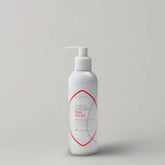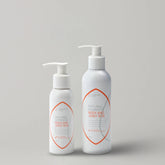Smelly Feet: What Causes It and How to Stop Naturally

Smelly feet are mainly caused by sweat and bacteria breaking down on the skin, especially when feet stay enclosed in shoes for long periods. To stop feet from smelling, keep them dry, wear breathable socks, wash them daily, and use natural foot deodorants or antibacterial ingredients that support odour control.
Introduction
Smelly feet, medically known as bromodosis, is a surprisingly common issue that affects people of all ages. It’s often caused by excess perspiration and bacteria buildup on the skin, which can lead to unpleasant odours, especially in enclosed shoes.
In this guide, we’ll explain what causes smelly feet, how to manage it naturally, and effective preventive steps that support freshness and confidence, from hygiene habits to natural deodorant ingredients that may help neutralise odour without harsh chemicals.
What Causes Smelly Feet?
Foot odour primarily happens when sweat interacts with bacteria living on the skin. While sweating is natural, it helps regulate body temperature, the problem arises when moisture is trapped inside shoes or socks, creating the perfect environment for bacteria and fungi to multiply.
1. Sweat and Bacteria
Each foot has over 250,000 sweat glands, producing up to half a cup of sweat per day . When this sweat mixes with naturally occurring bacteria, it breaks down proteins and fatty acids, producing isovaleric acid, the main cause of that distinctive “cheesy” smell. (source: Mayo Clinic)
2. Warm, Moist Environments
Tight or synthetic shoes trap heat and moisture, creating an ideal breeding ground for bacteria. If feet aren’t properly aired out or socks aren’t changed regularly, odour intensifies.
3. Poor Foot Hygiene
Skipping daily washing, not drying feet thoroughly (especially between toes), or wearing the same socks multiple times can lead to a persistent smell.
4. Fungal Growth
Conditions like athlete’s foot (tinea pedis) may worsen odour due to fungal overgrowth. While common, it’s important to manage it with appropriate hygiene and consult a healthcare professional if symptoms persist.
5. Hormones and Stress
Hormonal changes such as during adolescence and stress may increase sweat production, which can amplify odour issues even in people who maintain good hygiene.
Why Some People Have Stronger Foot Odour
Not everyone who sweats experiences smelly feet. Several factors influence odour intensity:
- Genetics: Some individuals naturally sweat more (hyperhidrosis).
- Diet: Spicy foods, caffeine, and alcohol can trigger excess perspiration.
- Footwear choices: Non-breathable materials trap heat.
- Hormonal fluctuations: Teens and pregnant women may experience increased sweat activity.
- Prolonged shoe wear: Athletes, tradespeople, and those wearing closed footwear daily are more prone.
How to Stop Feet from Smelling Naturally
Reducing foot odour doesn’t require harsh chemicals, small, consistent steps make the biggest difference. Here’s how to support fresh, comfortable feet naturally.
1. Wash Feet Daily (and Dry Thoroughly)
Use warm water and mild soap to remove sweat, dirt, and bacteria. Don’t forget between the toes, trapped moisture there is a major odour source. Pat dry completely before wearing socks.
2. Choose Breathable Socks
Opt for cotton, bamboo, or moisture-wicking wool. These materials absorb sweat and let air circulate. Avoid artificial fabrics that trap heat and moisture.
3. Rotate Shoes Regularly
Give shoes a full day to dry before wearing them again. Leaving them in the sun or using shoe deodorisers may help reduce bacteria growth.
4. Use Natural Deodorants for Feet
Products with crystal minerals or essential oils are known to help neutralise odour-causing bacteria. These natural options are gentle yet effective for daily use.
5. Let Your Feet Breathe
Whenever possible, go barefoot at home or wear open sandals. Fresh air helps keep skin dry and discourages bacteria buildup.
6. Manage Sweat Naturally
Sprinkling natural powders (like cornstarch or arrowroot) inside socks may help absorb moisture and keep feet drier throughout the day.
7. Watch Your Diet and Hydration
Foods rich in zinc and magnesium may support balanced perspiration, while staying hydrated helps the body regulate temperature more efficiently.
8. Maintain Toenail and Skin Health
Trim nails regularly, exfoliate dead skin, and avoid buildup of calluses where bacteria can hide.
Natural Ingredients That Support Odour Control
Some plant-based and mineral ingredients are commonly used to support freshness and reduce bacteria on the skin’s surface.
| Ingredient | Benefit |
| Crystal Mineral | Naturally forms a barrier that inhibits odour-causing bacteria |
| Tea Tree Oil | Known for antibacterial and antifungal properties |
| Witch Hazel | Helps tone skin and reduce moisture accumulation |
| Eucalyptus Oil | Provides a clean, cooling sensation |
| Bamboo Extract | Absorbs excess moisture and supports skin balance |
These ingredients are found in many natural deodorants designed for both underarms and feet. offering gentle, effective odour management without synthetic fragrances.
Read more: Best Natural Ingredients for Foot Odour Relief and Fresh Feet
Daily Routine for Fresh Feet
Here’s a simple daily routine that can help:
1. Morning:
- Wash and dry feet completely.
- Apply a natural deodorant or odour-control powder.
- Wear fresh, breathable socks.
2. Midday (if active or warm weather):
- Change socks if feet feel damp.
- Air out shoes briefly.
3. Evening:
- Soak feet in warm water with Epsom salt or apple cider vinegar once or twice a week (optional).
- Moisturise with lightweight, non-greasy lotion to prevent cracking.
Footwear Hygiene Tips
Foot odour often lingers in shoes rather than feet alone. Here’s how to handle that:
- Alternate footwear and don’t wear the same pair every day.
- Remove insoles and let them dry out overnight.
- Use odour-absorbing shoe inserts (activated charcoal or cedar).
- Avoid walking barefoot in public showers or gyms to minimise bacterial spread.
When to Consult a Professional
If your foot odour persists despite good hygiene, it may be worth consulting a qualified healthcare professional or podiatrist. They can check for conditions like fungal infections or hyperhidrosis and provide guidance suited to your needs.

Frequently Asked Questions
Why do my feet smell even after washing?
If odour returns quickly, bacteria may still live inside shoes or socks. Make sure both are washed or replaced regularly, and dry your feet completely before putting on footwear.
Can diet affect foot odour?
Yes, foods like garlic, onions, and spicy dishes may contribute to stronger body odours. Staying hydrated and eating balanced meals may help regulate sweat composition.
Are natural deodorants effective for feet?
Yes, natural deodorants containing minerals may help neutralise odour-causing bacteria without blocking pores.
How often should I change socks?
Daily at minimum or more frequently during hot weather or exercise.
Is smelly feet a sign of poor hygiene?
Not necessarily. Even people with excellent hygiene can experience foot odour due to sweat, bacteria, and shoe conditions.
For a detailed step-by-step guide on reducing odour naturally, read How to Stop Foot Odour Naturally.
Final Thoughts
Smelly feet are common and manageable. By understanding the science behind sweat and bacteria, you can take practical, natural steps to stay fresh. Consistent hygiene, breathable materials, and natural odour-fighting ingredients can make all the difference without relying on harsh chemicals.
For fresh, confident feet every day, Shop our Fragrance-Free Foot Deodorant. Formulated with Crystal Mineral Salts known to support odour balance naturally. Visit our blog for more wellness insights and daily care inspiration.
Disclaimer: At Florentine Gold, we’re all about natural wellness and love sharing tips, stories, and insights we’ve picked up along the way. That said, everything you read in this blog is for general information and educational purposes only. It’s not medical advice and isn’t intended to diagnose, treat, cure, or prevent any condition. If you’re dealing with a health issue or taking medication, we always recommend checking in with your healthcare provider as part of your wellness journey.








